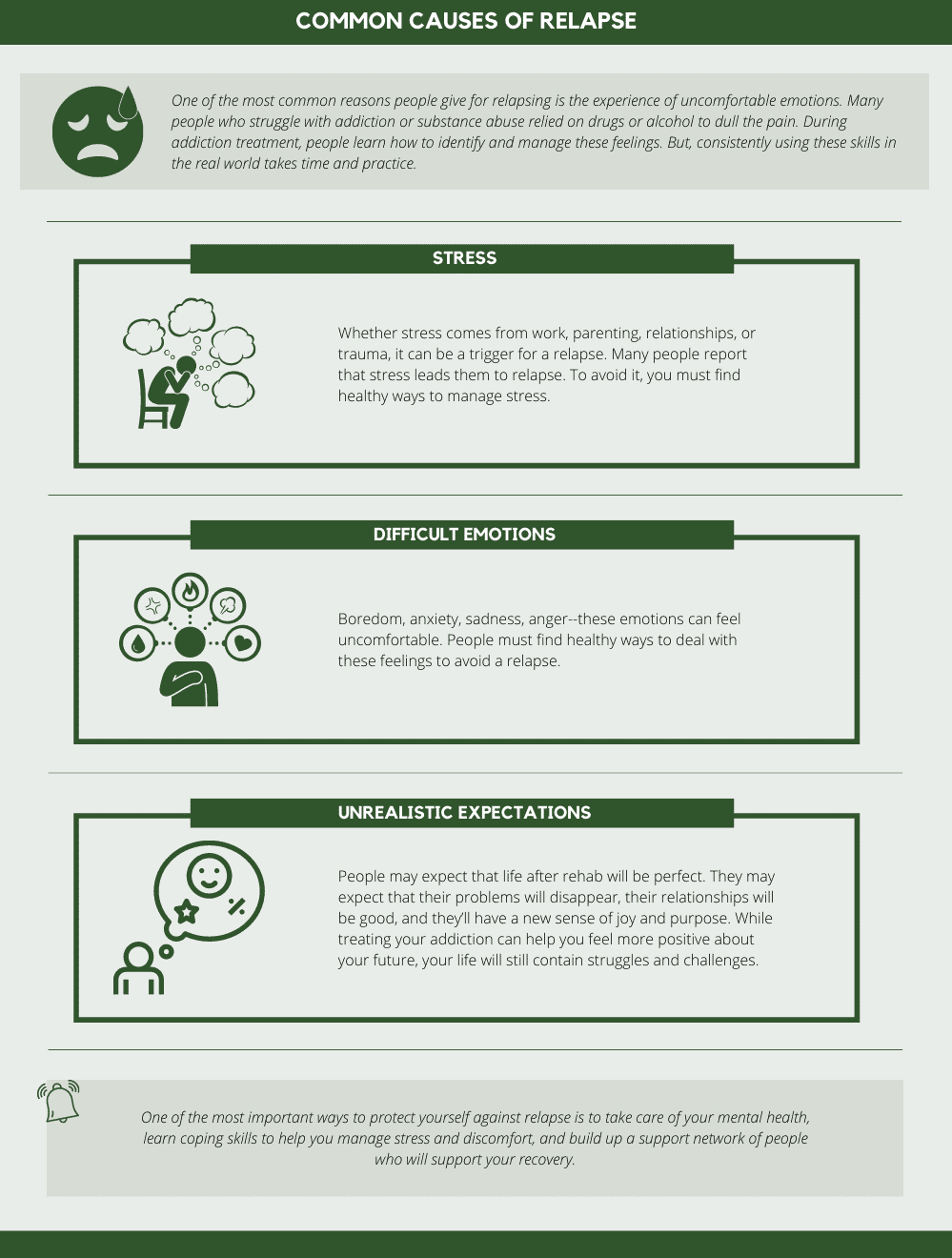Addiction is not something that can be cured. While finishing a treatment program offers the chance at a new beginning, most people have to continue to work hard to avoid returning to substance abuse. About half of all people who finish a treatment program have at least one relapse.[1]
After completing addiction treatment, most people leave with a sense of having a fresh start. They’ve done the work, invested the time, and successfully learned what they need to do to stay sober. Relapsing can feel like the end of something, a failure, or like a crushing disappointment. But a relapse isn’t any of these things. Instead, it’s important to remember that addiction is a disease that needs to be managed, and even with lots of hard work and preparation, people might still struggle with it.
There are things you can do to make a relapse less likely. Understanding the physical and emotional aspects of addiction and relapse can help you make a relapse prevention plan. And if a relapse does occur, you can think about the circumstances around it and use that knowledge to make a new plan.
There will be challenges. You will have setbacks. These are a normal part of the recovery process. A relapse is not the end of the road–it is the chance to move forward with a better understanding of the situation and yourself. But first, you must understand what caused your relapse in the first place. Let’s take a look at some of the most common causes of relapse in addiction recovery.
Common Causes of Relapse: Emotional Triggers
One of the most common reasons people give for relapsing is the experience of uncomfortable emotions.[2] Many people who struggle with addiction or substance abuse relied on drugs or alcohol to dull the pain. During addiction treatment, people learn how to identify and manage these feelings. But, consistently using these skills in the real world takes time and practice.
Stress
Whether stress comes from work, parenting, relationships, or trauma, it can be a trigger for a relapse. Many people report that stress leads them to relapse. To avoid it, you must find healthy ways to manage stress.
Difficult emotions
Boredom, anxiety, sadness, anger–these emotions can feel uncomfortable. People must find healthy ways to deal with these feelings to avoid a relapse.
Unrealistic expectations
People may expect that life after rehab will be perfect. They may expect that their problems will disappear, their relationships will be good, and they’ll have a new sense of joy and purpose. While treating your addiction can help you feel more positive about your future, your life will still contain struggles and challenges.
One of the most important ways to protect yourself against relapse is to take care of your mental health, learn coping skills to help you manage stress and discomfort, and build up a support network of people who will support your recovery.

Environmental Relapse Triggers
For people who lived with addiction, drugs or alcohol may have been a constant presence in your life. Environmental triggers can lead people to relapse, even if they feel confident in their ability to stay sober. Some common causes or environmental relapse triggers include:
- People who you used with— Seeing old friends can be a trigger that could lead to a relapse. If you used to use drugs or drink with certain people, it’s a good idea to avoid them to protect your recovery.
- Places— That bar you went to after work or the friend’s house where you used drugs might trigger a relapse. Being in a place where you used to use drugs or alcohol can make you more inclined to lower your guard.
- Situations— Celebrations like weddings, BBQs, and birthday parties can be triggering. Holidays, vacations, certain seasons, or even after-work happy hours can make it more likely that you’ll relapse.
Some people find that it’s easier to simply avoid the environmental triggers that might lead to relapse. If you can’t avoid a situation, make sure you’ve got a sober buddy by your side–and make sure you can leave if you need to.
How to Handle Common Causes of Relapse
It takes time to feel confident using the skills you learned in addiction treatment. It might be helpful to think about recovery in terms of progress–not perfection. You will sometimes feel discouraged. You will face triggers. You will need to get extra support and education along the way. Here are some ways you can cope with the common causes of relapse to prevent relapsing yourself.
Learn to manage stress
Find new, healthy ways to cope with stress. This might include talking to a supportive friend, exercising, journaling, taking up a new hobby, or volunteering. Finding a way to manage your stress is one of the best things you can do to support your recovery.
Set realistic goals
Setting goals can give you something to work towards and achieve. Make small, realistic goals related to work, relationships, health, or any other factor of your life. These goals can help you stay on track in recovery, increase your self-confidence, and lead to big things in the future.
Learn about addiction
Learning about how addiction works and what recovery is really like will help you prepare for the reality of recovery. Talk to other people in recovery, join an alumni group, or continue addiction counseling.
Get support
Supportive friends and family, sober living residents, counselors, and other people in recovery can be great relationships to focus on. Make a realistic goal to have at least one person you can call if you’re facing a trigger, and build from there. Talk to your support network about your plans, goals, and challenges.
By increasing your support network, avoiding triggers, and increasing your ability to manage stress, you are giving yourself the best chance at lifelong success in recovery.

Get The Care You Need and Deserve
Woburn Addiction Treatment is a leader in the addiction treatment field, with proven success in facilitating long-term recovery. Our team of top clinical & medical experts specializes in treating addiction coupled with mental illness, ensuring that each person receives individualized care. Call us – we’re available 24/day, 7 days/week.
Learn How to Prevent a Relapse With Woburn Addiction Treatment
If you or someone you love require support at any stage of addiction or recovery, reach out to the staff at Woburn Addiction Treatment. Whether you are new to recovery or need to return to rehab after a relapse, we offer a range of programs designed to help you overcome addiction and live a healthy, fulfilling life. Don’t wait another day for the treatment you need. Call now to talk to an admissions counselor.
References:


